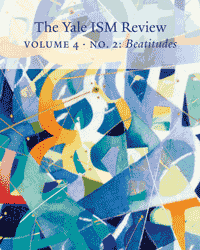Herménégilde Chiasson, translated by Jo-Anne Elder
Editor’s Note: Herménégilde Chiasson’s book-length poem, Beatitudes, has been called a postmodern Sermon on the Mount. It is considered one of his finest works. 49th Shelf, in presenting the work, observed: “For Herménégilde Chiasson, every work of art is both a cry and a prayer. Beatitudes reflects this perspective by connecting everyday events—people losing their keys or their cellphone signals—to the universal.” Composed in the form of a litany, the poem begins in mid-sentence, and ends with a comma. The following excerpt is taken from the beginning of the poem.
those who raise their heads in astonishment at the
raucous cry of birds,
those who await the end of twilight,
those who ceaselessly leaf through catalogues and
order nothing from life,
those who sleep on their side, waiting for the pain
to subside in a single sip of water,
those who believe it is time to bear their misery,
smiling through the procession of painful stupidities and
offering atonement for the fullness of errors that are, in
truth, so forgivable,
those who weep and find no consolation, confusing
love with bitter anger in the loose thread of unravelling
clothes,
those who walk ahead even though the wind blinds
them,
they are, certainly, on their way to heaven;
those who lean heavily over countertops, whispering
about their jeopardized affairs,
those who find their keys in the bottom of plastic bags
they were about to throw out,
those who carry their food home in taxicabs,
those who stand up in public meetings where they
believe they have recognized their lives put on display in the
broad light of day,
those who pretend to be outraged by those who sing
out resignation in a borrowed tongue,
those who carry the discomfort of defeat in half-smiles
stained by underlying rage,
those who clown around in hard hats too heavy for
their bird-like heads,
those whose hands lift into the air as if separate from
their bodies, as if sketching into thin air the thoughts they hope
will one day be written in indelible ink,
those who carry their children like slumbering
rivers, living poetry, acts of faith through the soundproof,
overheated corridors of modern buildings,
those who apologize profusely before slipping away
into the subdued obscurity of an unavoidable solitude from
which there is no escape,
they, too, will see heaven;
those who sob in public, immodestly displaying their
poverty and their rebellion,
those who walk in anger, with methodical steps, under
drab coats along cold, grey beaches,
those who hold onto the fervent hope that one day
they will find the objects they thought lost and buried
forever in mud-soaked marshes,
those who mutter under their breath, wondering
whether they have said what should have been said and
whether they have been understood as though, once again,
they are using a grimy sponger to wipe clean the constant,
dreary hum that covers their voices,
those who play,
those who laugh,
those who read,
they, too, yes, they are promised heaven;
 Herménégilde Chiasson is one of Canada’s most accomplished writer-artists. He is the author of more than twenty books of poetry, over thirty plays, and several collections of essays. A multi-disciplinary artist, he has received numerous awards for his work, including the Governor General’s Award for poetry, the Molson Prize, le prix France-Acadie, le Grand prix de la francophonie canadienne, the prestigious Chevalier de l’ordre des Arts et des Lettres, and the Prix littéraire Antonine-Maillet-Acadie Vie. From 2003 to 2009, he served as Lieutenant Governor of New Brunswick.
Herménégilde Chiasson is one of Canada’s most accomplished writer-artists. He is the author of more than twenty books of poetry, over thirty plays, and several collections of essays. A multi-disciplinary artist, he has received numerous awards for his work, including the Governor General’s Award for poetry, the Molson Prize, le prix France-Acadie, le Grand prix de la francophonie canadienne, the prestigious Chevalier de l’ordre des Arts et des Lettres, and the Prix littéraire Antonine-Maillet-Acadie Vie. From 2003 to 2009, he served as Lieutenant Governor of New Brunswick.
Jo-Anne Elder has translated many of Chiasson’s works of poetry, including Beatitudes and Conversations and, in collaboration with Fred Cogswell, Climates. She and Fred Cogswell also edited and translated Unfinished Dreams: Contemporary Poetry of Acadie.
